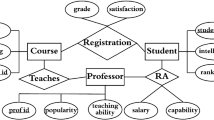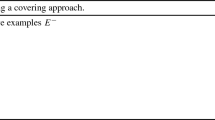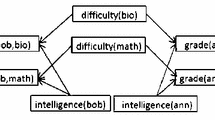Abstract
Given the very widespread use of multirelational databases, ILP systems are increasingly being used on data originating from such warehouses. Unfortunately, even though not complex in structure, such business data often contain highly non-determinate components, making them difficult for ILP learners geared towards structurally complex tasks. In this paper, we build on popular transformation-based approaches to ILP and describe how they can naturally be extended with relational aggregation. We experimentall y show that this results in a multirelational learner that outperforms a structurally-oriented ILP system both in speed and accuracy on this class of problems.
Access this chapter
Tax calculation will be finalised at checkout
Purchases are for personal use only
Preview
Unable to display preview. Download preview PDF.
Similar content being viewed by others
References
Petr Berka. Guide to the Financial Data Set. In A. Siebes and P. Berka, editors, PKDD2000 Discovery Challenge, 2000.
Luce Cabibbo and Riccardo Torlone. A Framework for the Investigation of Aggregate Functions in Database Queries. In C. Beeri and P. Bruneman, editors, Proceedings of the Seventh International Conference on Database Theory (ICDT). Springer-Verlag, 1999.
Thorsten Joachims. Making Large-Scale SVM Learning Practical. In B. Schölkopf, C. Burges, and A. Smola, editors, Advances in Kernel Methods-Support Vector Learning. MIT Press, 1999.
Thorsten Joachims. Estimating the Generalization Performance of an SVM Efficiently. In P. Langley, editor, Proceedings of the Seventeenth International Conference on Machine Learning (ICML). Morgan Kaufmann, 2000.
Jörg-Uwe Kietz, Regina Zücker, and Anca Vaduva. Mining Mart: Combining Case-Based Reasoning and Multistrategy Learning into a Framework for Reusing KDD-Applications. In R. S. Michalski and P. Brazdil, editors, Proceedings of the Fifth International Workshop on Multistrategy Learning (MSL), 2000.
Stefan Kramer, Bernhard Pfahringer, and Christoph Helma. Stochastic Propositionalization of Non-Determinate Background Knowledge. In D. Page, editor, Proceedings of the Eighth International Conference on Inductive Logic Programming (ILP). Springer-Verlag, 1998.
Nada Lavrač. Principles of knowledge acquisition in expert systems. PhD thesis, University of Maribor, Ljubljana, Slovenia, 1990.
Nada Lavrač and Sašo Džeroski. Inductive Logic Programming: Techniques and Applications. Ellis Horwood, 1993.
Nada Lavrač and Peter Flach. An extended transformation approach to Inductive Logic Programming. Technical Report CSTR-00-002, Department of Computer Science, University of Bristol, March 2000.
Nada Lavrač, Dragan Gamberger, and Peter Turney. A relevancy filter for constructive induction. IEEE Intelligent Systems, 13(2):50–56, 1998.
Stephen Muggleton. Inverse entailment and Progol. New Generation Computing, Special issue on Inductive Logic Programming, 13(3–4):245–286. 1995.
Stephen Muggleton and Cao Feng. Efficient Induction of Logic Programs. In S. Arikawa, S. Goto, S. Ohsuga, and T. Yokomori, editors, Proceedings of the First International Workshop on Algorithmic Learning Theory (ALT). Springer-Verlag/Ohmsha Publishers, 1990.
Ross Quinlan. C4.5: Programs for Machine Learning. Morgan Kaufmann, 1993.
Stefan Wrobel. An algorithm for multi-relational discovery of subgroups. In J. Komorowski and J. Zytkow, editors, Proceedings of the First European Symposium on Principles of Data Mining and Knowledge Discovery (PKDD). Springer-Verlag, 1997.
Stefan Wrobel. Inductive Logic Progamming for Knowledge Discovery in Databases. In N. Lavrač and S. Džeroski, editors, Relational Data Mining. Springer-Verlag, Berlin, New York, 2000.
Author information
Authors and Affiliations
Editor information
Editors and Affiliations
Rights and permissions
Copyright information
© 2001 Springer-Verlag Berlin Heidelberg
About this paper
Cite this paper
Krogel, MA., Wrobel, S. (2001). Transformation-Based Learning Using Multirelational Aggregation. In: Rouveirol, C., Sebag, M. (eds) Inductive Logic Programming. ILP 2001. Lecture Notes in Computer Science(), vol 2157. Springer, Berlin, Heidelberg. https://doi.org/10.1007/3-540-44797-0_12
Download citation
DOI: https://doi.org/10.1007/3-540-44797-0_12
Published:
Publisher Name: Springer, Berlin, Heidelberg
Print ISBN: 978-3-540-42538-0
Online ISBN: 978-3-540-44797-9
eBook Packages: Springer Book Archive




